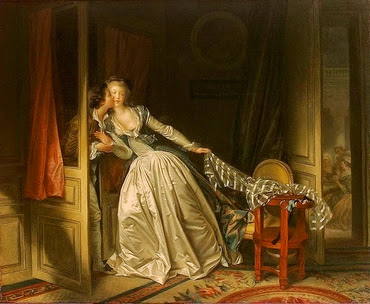This is the 8th post in the Wilhelm Meister's series, the last of this season; the Goethe's characters will come back in September.

The stolen kiss - J.H. Fragonard
Today I'll tell you something that happens while Wilhelm is at the Count's castle, a story about the Count and the Countess. I’m afraid there isn't any song linked to that story, but I'm telling you anyway because it will become important at the end of the novel. Besides, the story is very funny.
Wilhelm likes the Countess a lot, but he's very aware of his vow of not having any love affair with a woman; the Countess also likes Wilhelm very much, but she's very aware of her wedding vows too. Therefore, they meet as often as they can but maintaining always their decorum. Both the Baroness (the Countess’ friend and confidant) and Philine (who succeeded in being part of the Countess’ circle because of her warmth and cleverness) don’t take those vows that seriously and keep looking for a way to force the affair between Wilhelm and the Countess. Eventually, the Baroness thinks of one of the jokes that made her famous (and feared) for in the court.
One day that the Count has gone hunting, the Baroness takes Wilhelm to the noble’s private rooms and dresses him with his clothes. Once in disguise, she seats him on an armchair from which he can see the room’s door through a mirror. The scheme is that she will warn the Countess that the Count has returned earlier and in a bad mood, so she will recommend her to go to meet him and cheer him up; Wilhelm, in turn, should pretend to be the Count as long as possible. So there it is the young man, waiting and worried about what he is about to do when the Countess arrives (this guy is hopeless!), and when the door finally opens, it’s the Count who shows in the doorway. The gazes of both men met in the mirror and then, the Count shuts the door and leaves. Then the Baroness, who knows that the real Count has just arrived, goes and helps Wilhelm to leave quickly. Both wait very worried for the Count's reaction.
A while later, the Count asks Wilhelm to read him aloud, as he often does. He doesn't look angry, he's even calmer and kinder than usual. Wilhelm doesn't understand anything. The days go by and the Count still doesn't mention the incident, but his manners have changed. Now he's often seen pensive, less demanding or pedantic, with a deeply religious behaviour absolutely unknown. The Baroness, puzzled, explains her joke to Jarno, “as that gentleman and she already stood in a relation to each other, where it is not usual to be very cautious in keeping secrets”. Jarno laughs, as he understands why the Count is so distressed: that day, when he went into his room, he didn't see Wilhelm staring at him through the mirror, he saw himself! The Count saw indeed Wilhelm's reflection, dressed with his clothes, but he thought that it was an apparition announcing his death. The poor Count! Nevertheless, they’d better keep the Count in the dark, now that he's so docile; besides, now the Countess can spend more time with Wilhelm. Therefore, the Baroness and Jarno take advantage of the situation to influence the Count, hoping he won’t bother anybody anymore.
In the meantime, the Countess continues her relationship with Wilhelm, a chaste relationship until the farewell, when the Countess gives him a medallion with a little plait of her hair; Wilhelm can't stand it any longer and embraces her. Among hugs and kisses, the Countess screams and urges Wilhelm to leave.
That's how this story ends, so far. We don't have any linked song, so we’ll go over one we've previously listened, Wer nie sein Brot mit Tränen ass. We talk about this song on the post Bread with tears, back then we listened to Schubert's version; this week we are listening to Wolf’s one which is not the most common for voice and piano but the orchestrated version, because this Lied is among the few that Wolf orchestrated. The performers are Dietrich Henschel and the Deutsches Symphonie-Orchester Berlin conducted by Kent Nagano.
Harfenspieler III
Wer nie sein Brot mit Tränen aß,
Wer nie die kummervollen Nächte
Auf seinem Bette weinend saß,
Der kennt euch nicht, ihr himmlischen Mächte.
Ihr führt ins Leben uns hinein,
Ihr laßt den Armen schuldig werden,
Dann überlaßt ihr ihn der Pein:
Denn alle Schuld rächt sich auf Erden.
Who never ate his bread in sorrow,
Who never spent the darksome hours
Weeping and watching for the morrow,
He knows ye not, ye gloomy Powers.
To earth, this weary earth, ye bring us,
To guilt ye let us heedless go,
Then leave repentance fierce to wring us:
A moment’s guilt, an age of woe!
(translation by Thomas Carlyle)
Read more: The story of a disappointment














Comments powered by CComment